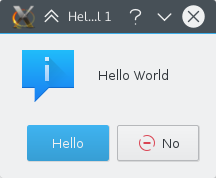Development/Tutorials/First program/KF5
Appearance
Hello World
| Tutorial Series | Beginner Tutorial |
| Previous | C++, Qt, Building KDE |
| What's Next | Tutorial 2 - KXmlGuiWindow |
| Further Reading | CMake |
Abstract
Your first program shall greet the world with a friendly "Hello World", what else? For that, we will use a KMessageBox and customise one of the buttons.


Tip
To get more information about any class you come across, you can use the ‘kde’ search engine. For example, to look for information about KMessageBox, just type "kde:kmessagebox" into Konqueror, Rekonq or KRunner, and you’ll be taken to the documentation.
The Code
#include <cstdlib>
#include <QApplication>
#include <QCommandLineParser>
#include <KAboutData>
#include <KLocalizedString>
#include <KMessageBox>
int main (int argc, char *argv[])
{
// 1
QApplication app(argc, argv);
// 2
KLocalizedString::setApplicationDomain("tutorial1");
// 3 new KAboutData constructor
KAboutData aboutData(
// The program name used internally. (componentName)
QStringLiteral("tutorial1"),
// A displayable program name string. (displayName)
// 4
i18n("Tutorial 1"),
// The program version string. (version)
QStringLiteral("1.0"),
// Short description of what the app does. (shortDescription)
i18n("Displays a KMessageBox popup"),
// The license this code is released under
// 5
KAboutLicense::GPL,
// Copyright Statement (copyrightStatement = QString())
i18n("(c) 2015"),
// Optional text shown in the About box.
// Can contain any information desired. (otherText)
i18n("Some text..."),
// The program homepage string. (homePageAddress = QString())
QStringLiteral("http://example.com/"),
// The bug report email address
// (bugsEmailAddress = QLatin1String("[email protected]")
QStringLiteral("[email protected]"));
aboutData.addAuthor(i18n("Name"), i18n("Task"), QStringLiteral("[email protected]"),
QStringLiteral("http://your.website.com"), QStringLiteral("OSC Username"));
// 6
KAboutData::setApplicationData(aboutData);
// 7
QCommandLineParser parser;
parser.addHelpOption();
parser.addVersionOption();
aboutData.setupCommandLine(&parser);
parser.process(app);
aboutData.processCommandLine(&parser);
KGuiItem yesButton( i18n( "Hello" ), QString(),
i18n( "This is a tooltip" ),
i18n( "This is a WhatsThis help text." ) );
return
KMessageBox::questionYesNo
(0, i18n( "Hello World" ), i18n( "Hello" ), yesButton )
== KMessageBox::Yes? EXIT_SUCCESS: EXIT_FAILURE;
}
Notes
- no more KApplication https://community.kde.org/Frameworks/Porting_Notes#Application
- no more KAboutAdata catalogName https://community.kde.org/Frameworks/Porting_Notes#KAboutData
- new KAboutData constructor http://api.kde.org/frameworks-api/frameworks5-apidocs/kcoreaddons/html/classKAboutData.html
- use i18n for general and immediate cases, ki18n for special KF5 Cookbook https://books.kde.org/frameworks5/KDE-Frameworks-Cookbook.html#writing-messages
- license keys http://api.kde.org/frameworks-api/frameworks5-apidocs/kcoreaddons/html/classKAboutLicense.html#a29386ce80267871552aedd21d9ce6bbb
- Set about data https://mail.kde.org/pipermail/kde-frameworks-devel/2015-June/024983.html
- new way to parse command line arguments https://community.kde.org/Frameworks/Porting_Notes#KCmdLineArgs
CMakeLists.txt
project (tutorial1)
#1
cmake_minimum_required(VERSION 2.8.12 FATAL_ERROR)
set(QT_MIN_VERSION "5.3.0")
set(KF5_MIN_VERSION "5.2.0")
#2
find_package(ECM 1.0.0 REQUIRED NO_MODULE)
set(CMAKE_MODULE_PATH ${ECM_MODULE_PATH} ${ECM_KDE_MODULE_DIR} ${CMAKE_CURRENT_SOURCE_DIR}/cmake)
include(KDEInstallDirs)
include(KDECMakeSettings)
include(KDECompilerSettings)
include(FeatureSummary)
# Find Qt modules
find_package(Qt5 ${QT_MIN_VERSION} CONFIG REQUIRED COMPONENTS
Core # QCommandLineParser, QStringLiteral
Widgets # QApplication
)
# Find KDE modules
find_package(KF5 ${KF5_MIN_VERSION} REQUIRED COMPONENTS
CoreAddons # KAboutData
I18n # KLocalizedString
WidgetsAddons # KMessageBox
)
feature_summary(WHAT ALL INCLUDE_QUIET_PACKAGES FATAL_ON_MISSING_REQUIRED_PACKAGES)
set(tutorial1_SRCS main.cpp)
# just plain add_executable
add_executable(tutorial1 ${tutorial1_SRCS})
# module-based linking
target_link_libraries(tutorial1
Qt5::Widgets
KF5::CoreAddons
KF5::I18n
KF5::WidgetsAddons
)
install(TARGETS tutorial1 ${INSTALL_TARGETS_DEFAULT_ARGS})
